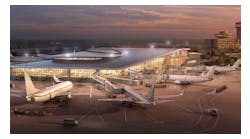Increased Travel Restrictions for Out Of State Travelers
On Apr. 7, in an effort to limit the spread of COVID-19, Arizona Governor Doug Ducey issued an Executive Order to increase quarantine guidelines for out-of-state travelers entering Arizona. Under the Executive Order, anyone who travels to Arizona from an area with substantial community spread through any airport in the state must isolate or quarantine themselves upon arrival for 14 days.
On Mar. 28, the Centers for Disease Control and Prevention issued a travel advisory urging residents of New York, New Jersey, and Connecticut to refrain from non-essential domestic travel for 14 days effective immediately.
Airport Director, Gladys Brown shared “Yuma International Airport is dedicated to the health and committed to the safety of our traveling guests for the protection of our community, and is diligently following guidance from the Governor’s office and from public health offices to ensure those traveling for essential reasons can continue to do so.”
The Executive Order will remain in effect throughout the state’s Public Health Emergency. Under the order:
The Arizona Department of Health Services shall coordinate with each aviation and airport authority in Arizona to effectuate the isolation or self-quarantine;
Pursuant to A.R.S. § 26-316, all Arizona Peace Officer Standards and Training Board certified law enforcement personnel and all state and local public health personnel shall assist the Arizona Department of Health Services in enforcing the provisions of this order;
And pursuant to A.R.S. §·26-317, any person who violates the provisions of this Order may be charged with a Class 1 misdemeanor and subject to a fine not to exceed $2,500.
This order shall not apply to the following people: airline employees; military personnel; healthcare workers; human services personnel; workers conducting essential infrastructure operations; and workers providing essential governmental functions. However, these people should follow guidelines from the CDC to minimize the risk of spread of COVID-19, such as wearing non-surgical masks.
Brown continued, “If you are experiencing severe COVID-19 symptoms contact your health care provider to seek medical attention as the CDC has advised. In the meantime, if you have a
fever, cough or difficulty breathing, please seek medical attention and do not fly. It is highly recommended to wear a face mask and maintain physical distancing in public areas. The TSA is now allowing passengers to bring up to 12 ounce bottles of hand sanitizer through the TSA screening, simply place the bottle in a separate bin. Please remember to wash your hands frequently with soap and/or alcohol-based sanitizer; avoid touching your eyes, nose, and mouth; cover your mouth or nose when you sneeze or cough; and maintain distance between yourself and anyone who is coughing or sneezing. The constant messaging regarding slowing down the spread of COVID-19 can be seen on the screens throughout the terminal and message boards and broadcasted. The Airport is doing its part in maintaining the operations and infrastructure as it is required to do. I am ensuring the team members feel safe to work, the airport continues to provide resources necessary and that daily check-ins are completed with each member of our team. It is critical that each of us be patient, listen to what is being said, and make the necessary adjustment to ensure safety and security is not compromised.”


